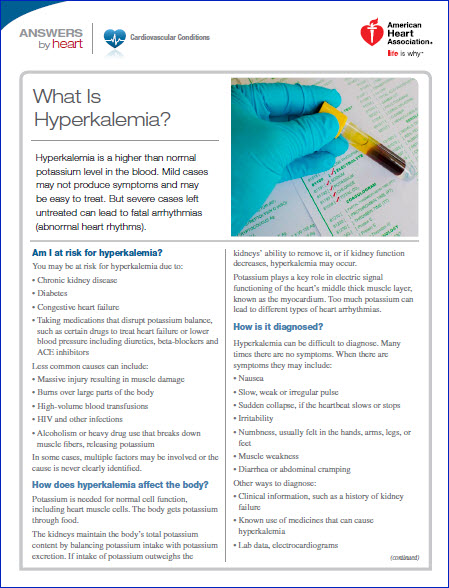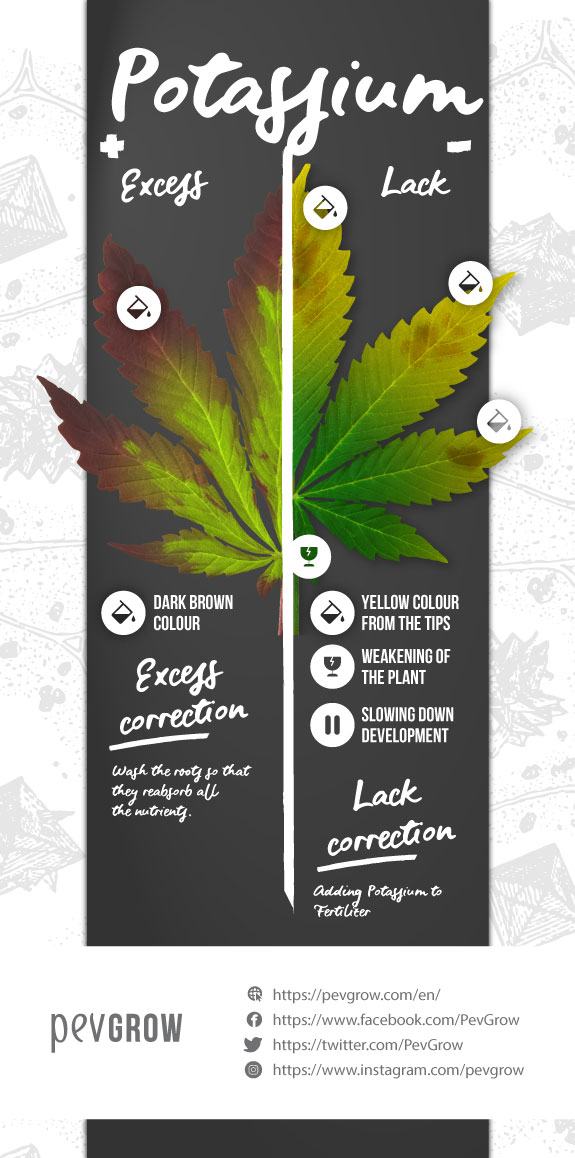For some people high potassium can be managed with changes to their diet alone. 4 Abdominal gas and bloating.
/diet-for-managing-hyperkalemia-4138591_v2-905e3f02aa5446aa822a2806a7abba75.png) Low Potassium Diet Benefits And How It Works
Low Potassium Diet Benefits And How It Works
Potassium is an essential nutrient found in foods.

What happens when your potassium gets too high. You can lose too much potassium in the urine or stool. Hyperkalemia can also be caused by certain blood pressure lowering drugs and supplements. This can lead to an irregular heartbeat reduced or absent pulse muscle weakness and difficulty breathing.
When potassium levels are high smooth muscle contractions may be too weak to coordinate that forward movement through the GI tract. Also known as water pills or diuretics these types of medications are often prescribed for people who have high blood pressure or heart disease. This falsely raises the amount of potassium in the blood sample even though the potassium level in your body is actually.
The ruptured cells leak their potassium into the sample. Hypokalemia rarely occurs as a result of dietary deficiencies because potassium is the most widely abundant nutrient found in food. But even if youre on prescription medication carefully choosing what you eat is a very important part of managing high potassium.
Occasionally low potassium is caused by not getting enough potassium in your diet. This can happen by taking certain medicines such as diuretics water pills to treat high blood pressure or if you have diarrhea. It can even occur if you consume a diet thats very high in potassium or are dehydrated.
This is one symptom that can be hard to link to high levels of potassium. When your potassium is too high it can weaken or stop your nerves from transmitting. High potassium can even cause a heart attack or death.
But too much potassium in your blood can damage your heart and cause a heart attack. You may experience diminished reflexes or numbness or tingling of your extremities. Unfortunately many people do not feel symptoms of high potassium until its too late and their heart health worsens.
Vomiting diarrhea or both also can result in excessive potassium loss from the digestive tract. Healthcare providers can measure the amount of potassium in your body via a simple blood test. Any time you eat food containing a lot of potassium your potassium level can go up.
But if your potassium levels are high enough to cause symptoms you may have. While it could be the case that you took in too much potassium your nausea could be caused by a myriad of other possibilities. You get potassium from food but this potassium can build up in your body if you have kidney problems.
Potassium plays a major role in regulating muscle function and homeostasis or balancing the bodys chemical and electrical impulses. Ideally your potassium level should be between 36 to 52 millimoles per liter mmolL. This can lead to nausea vomiting and the build-up of abdominal gas.
Gastrointestinal symptoms of hyperkalemia can include. Hyperkalemia occurs when your body cant filter out. Look for other symptoms on this list in addition to the nausea for a higher likelihood of it being due to high potassium intake.
Too much potassium in your blood can affect the way your heart works causing it to go into an abnormal rhythm which can be very dangerous. Tiredness or weakness a feeling of numbness or tingling nausea or vomiting trouble breathing chest pain palpitations or irregular heartbeats. Hyperkalemia occurs when potassium levels in your blood get too high.
Instead it may be caused by the rupture of blood cells in the blood sample during or shortly after the blood draw. When blood potassium levels are too high it can inhibit muscle regulation including heartbeat. Potassium is a mineral that helps to keep your nerves and muscles working properly.
Potassium plays a role in your nerve impulses metabolism and blood pressure. Too much potassium though can be harmful especially for people who have pre-existing kidney disease or heart failure. Your nerves stimulate your muscles.
Often a report of high blood potassium isnt true hyperkalemia. Most of the potassium in your body is found in your cells. The body becomes depleted of potassium from abnormal losses.
If your potassium level is over 52 mmolL your doctor. This nutrient helps your nerves and muscles function. When you have too much potassium in your blood it is called high potassium or hyperkalemia.
Having too much potassium in your blood is known as hyperkalemia. Having too much potassium in your blood can be dangerous. High blood potassium can also be caused by Addison disease hemolytic anemia poorly controlled diabetes or if you have recently had a serious injury.
What Happens When you Drink Alcohol On An Empty Stomach An imbalance in your potassium levels can affect your nerves and their interaction with the muscle cells in the digestive tract heart and other bodily systems.
 What Causes High Potassium Levels Hyperkalemia Causes
What Causes High Potassium Levels Hyperkalemia Causes
 What Causes Low Potassium How To Treat Hypokalemia
What Causes Low Potassium How To Treat Hypokalemia
 High Potassium Foods To Avoid Eating For Chronic Kidney Disease
High Potassium Foods To Avoid Eating For Chronic Kidney Disease
 Potassium Sources Deficiencies Overdose Treatment More
Potassium Sources Deficiencies Overdose Treatment More
/hyperkalemia-symptoms-5ad4e0b0642dca00363403f9.png) Signs And Symptoms Of Hyperkalemia High Potassium
Signs And Symptoms Of Hyperkalemia High Potassium
/hyperkalemia-causes-23-5af1a766ff1b7800368607af.png) Hyperkalemia Causes And Risk Factors
Hyperkalemia Causes And Risk Factors
 Six Steps To Controlling High Potassium National Kidney Foundation
Six Steps To Controlling High Potassium National Kidney Foundation
 Potassium Sources Deficiencies Overdose Treatment More
Potassium Sources Deficiencies Overdose Treatment More
 Hyperkalemia High Potassium American Heart Association
Hyperkalemia High Potassium American Heart Association
High Potassium Hyperkalemia Causes Prevention Treatment American Kidney Fund Akf
 10 Effects Of Hyperkalemia On The Body
10 Effects Of Hyperkalemia On The Body
 Six Steps To Controlling High Potassium National Kidney Foundation
Six Steps To Controlling High Potassium National Kidney Foundation
 Lack Excess And Blockage Of Potassium In Cannabis Plants
Lack Excess And Blockage Of Potassium In Cannabis Plants
High And Low Potassium In Elderly Adults

Geen opmerkingen:
Een reactie posten
Opmerking: Alleen leden van deze blog kunnen een reactie posten.